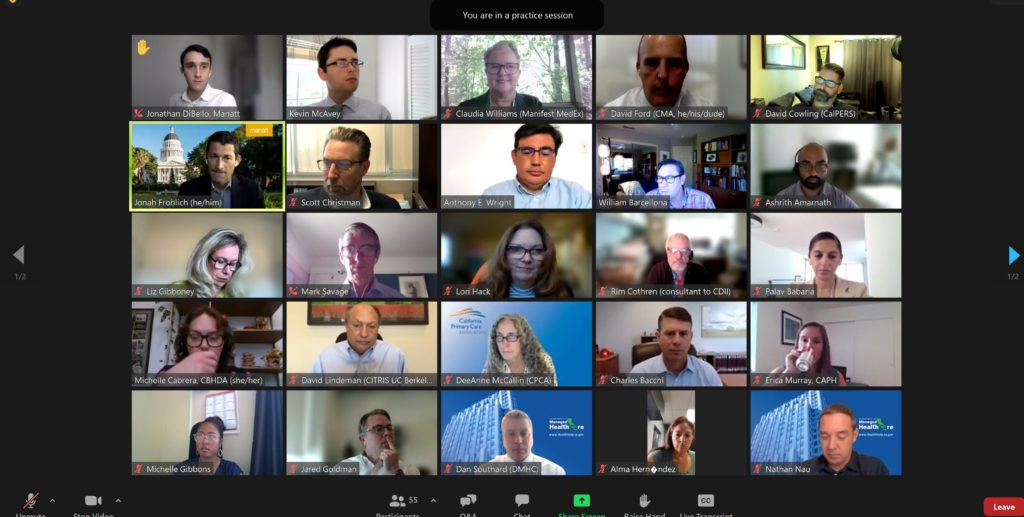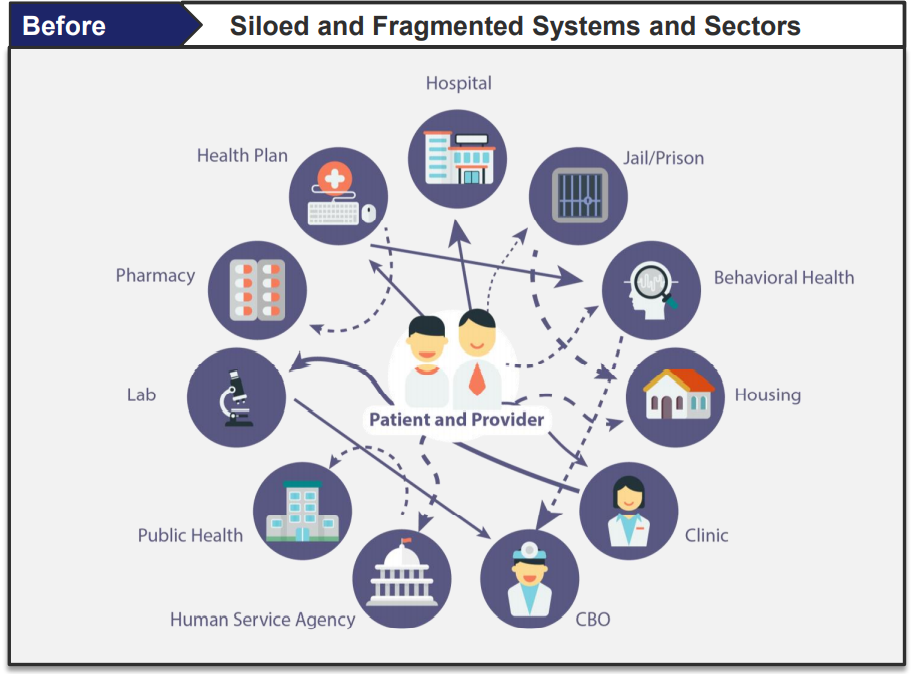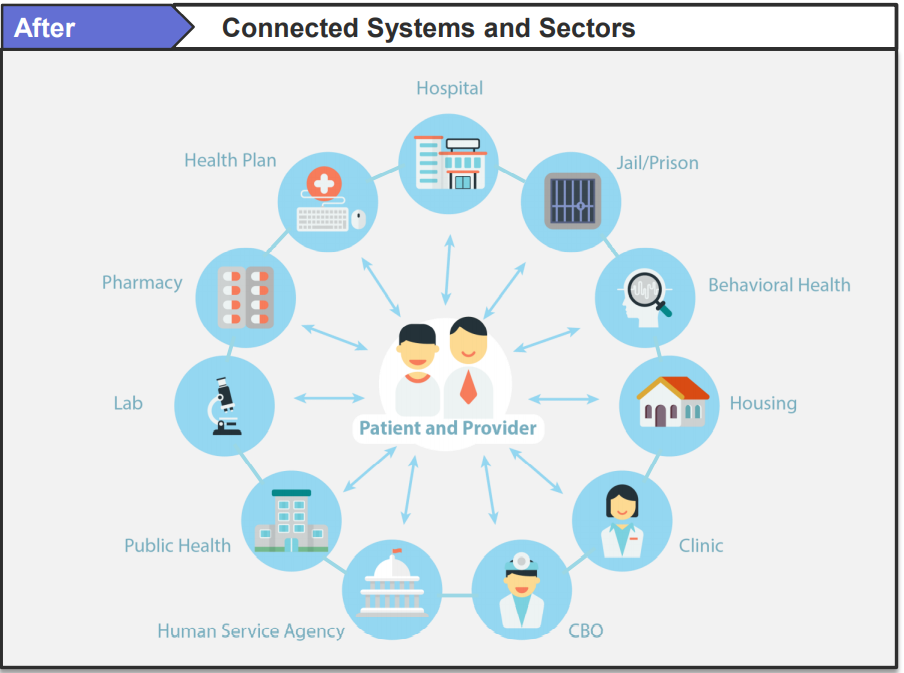
Data Exchange Framework Stakeholder Advisory Group Convenes for Inaugural Meeting
Key priorities emerge around ensuring equity and access for all Californians, building on existing infrastructure, and addressing patient privacy and security concerns
This week, the Stakeholder Advisory Group launched its work on the California Health and Human Services (CHHS) Data Exchange Framework pursuant to AB 133, the health trailer bill signed by Governor Newsom in July 2021. The legislation calls for hospitals, providers, and health plans to share health data by 2024 through the Data Exchange Framework – a single data-sharing agreement and a common set of policies and procedures that will govern the exchange of this health information.
The Stakeholder Advisory Group convened for its inaugural meeting on Tuesday, August 31st. Comprised of 27 diverse healthcare leaders and representatives from various state agencies, the Advisory Group will advise on the development of the Data Exchange Framework. The Advisory Group meetings are public, and CHHS welcomes and encourages public participation. More than 200 participants tuned into the first meeting of the group.
As the state’s largest nonprofit health data network, Manifest MedEx will be sharing updates about this important, transformative initiative that will impact all California healthcare organizations and residents both in the near- and long-term. This is a critical, bold step towards making health care better for Californians and building the health information network Californians deserve.
Here’s a quick recap of some of the exciting highlights and key themes that emerged as we live-tweeted during the meeting:
- Dr. Mark Ghaly, Secretary, CHHS, shared the draft vision statement – an impressive and ambitious vision to bring comprehensive, timely data sharing to California and improve the quality of care delivered.
“Every Californian, and the health and human service providers and organizations that care for them, will have timely and secure access to electronic information that is needed to address their health and social needs and enable the effective delivery of services to improve their lives and wellbeing.”
Vision for Data Exchange in CA


- Many members highlighted equity and access for all Californians as a key goal that should guide the work of the group.
“When I think about some of the key drivers of equity…to lift up the boat that is sinking the fastest, we really do need that transparency of information…I can’t think of a more important issue that delivers on equity.”
— Dr. Mark Ghaly, Secretary, CHHS
“We heard some great starts on those guiding principles, having to do with equity, building on what we have already built, staying focused on having a system that serves all of California, and that is just a start.”
— Liz Gibboney, Chief Executive Officer, Partnership Health Plan of California
“I’d recommend we specifically call out behavioral health. Obtaining behavioral health data for purposes of clinical coordination and service delivery has been a longstanding challenge, so it’s important to be explicit about the fact that ‘health’ includes both medical and behavioral health data.”
— Linnea Koopmans, Chief Executive Officer, Local Health Plans of California
“Would appreciate more explicit call-outs in the charter on the need to consider data related to justice, law enforcement, education data, etc. which are also either providing health/human services or key in informing case management and outcomes.”
— Michelle Cabrera, Executive Director, County Behavioral Health Directors Association
- Members and public participants also recommended building on existing health data exchange infrastructure and focusing beyond moving data to making use of the data to strengthen public health, improve equity and transform Medi-Cal. This requires bringing data together from many different sources to create longitudinal records for patients.
“We need to continue to build upon what we have worked so hard for in the HIE space and build upon the existing infrastructure and the evolution of health information exchange in California.”
— John Helvey, Executive Director, SacValley MedShare
“In our framework we need a clear definition of exchange (that includes) integrating it, matching it, bringing data together, and finding insights from the data.”
— Claudia Williams, Chief Executive Officer, Manifest MedEx
- The role of the patient, in “patient-centered” care should be “front and center” and every Californian, and the teams that care for them should have seamless access to needed data. The Data Exchange Framework will also need to robustly address security and privacy so that patients trust that the exchange of the data is safe and protected.
“Fortunately, federal law (HIPAA Privacy Rule, certified EHR technology) gives every Californian the right to access and use their health data, in support of the vision. The aspiration is to make it real for ALL Californians now.”
— Mark Savage, Savage Consulting
The Advisory Group also discussed key priority goals, barriers to overcome, and the Data Exchange Framework topics the group will need to address as required by AB133. Full meeting materials are available at: https://www.chhs.ca.gov/data-exchange-framework/
The work ahead for the Stakeholder Advisory Group is ambitious and will require focused effort to make the deadlines as outlined in the legislation. Manifest MedEx Chief Executive Officer Claudia Williams and Lori Hack, Interim Executive Director, California Association of Health Information Exchanges (CAHIE) are the two HIE representatives on the group. We look forward to bringing the voice of our communities and participants to this ground-breaking initiative.
The Advisory Group will meet again on October 7, 2021, from 10:00 AM to 12:30 PM. We invite you to follow @ManifestMedEx on Twitter for live tweets, share your thoughts with us and stay tuned for more updates!